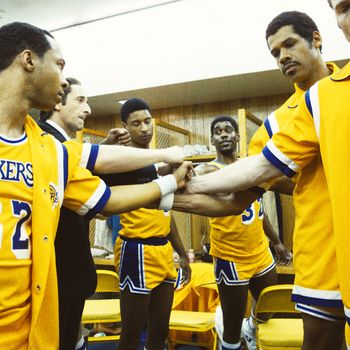
Given that the majority of this season finale covers the in-game drama of the 1984 NBA Finals, a seven-game classic between the Lakers and the Celtics, it’s worth noting how persuasively Winning Time has handled the actual basketball on the show. This is much harder than it sounds, given the abysmal quality of most gameplay on television and in the movies — though perhaps Teen Wolf’s team really is that incompetent when he’s not a wolf — but this show has the added challenge of making its performers fill in capably for some of the most legendary players of the era. The pre-credits sequence, integrating vintage footage of the real Finals with shots of the actors, is a particularly impressive flex. And the veracity means something too: There’s real drama taking place on the court, with the Celtics hammering the Lakers with brute physicality and mind games, and it would all look like Plan 9 From Outer Space if the staging was an afterthought.
The series had been building to this confrontation, though it’s perhaps one of those cases where history screws up a more satisfying narrative arc. After all the Lakers had gone through during the show’s second season — the front-office upheaval, the disappointing Finals run against the Sixers, the tumult in Magic Johnson’s and Jerry Buss’s personal lives, etc. — screenwriters would probably feel generous enough to let them win the series in an epic seven games, rather than have them fizzle out at the Garden. Then again, one-sided rivalries are not really rivalries, so a decade where Magic Johnson beats Larry Bird repeatedly in the NBA after beating him in the NCAA Finals while the two were in college isn’t much of a story. A year later, Magic and the Lakers would dust themselves off and beat the Celtics in six.
But in 1984, the Lakers perhaps had a little more growing to do. The Game One victory in Boston — and subsequent egging of the Lakers bus by fanatical Celtics fans — was the framing story that kicked off the show’s second season, and the finale returns to it, with a confident Magic predicting a sweep. The fretful Pat Riley, seeing the future, warns him not to get caught up in the hype: “Look, I know there’s a lot of hoopla,” he tells Magic. “A lot of bullshit. If you start focusing on that, next time those people riot, it’ll be for their parade.” The Celtics may be the less talented team, but they’re crafty and willing to play a little dirty to give themselves a chance. At a certain point, their strategy isn’t about outplaying the Lakers so much as muddying up the Lakers’ flow and turning the game ugly. And with an assist from the refs, the Boston faithful, and even the sweltering summer heat, they gain the necessary leverage.
The strength of “What Is and What Should Never Be” is that it gives each game in the series its proper weight: Game 2 should have given the Lakers a 2-0 lead heading home, making a comeback near impossible for the Celtics, but mental mistakes cost them down the stretch, with James Worthy coughing up an inexplicable cross-court pass and Magic once again trying to play hero ball in the closing seconds, this time failing even to put up a shot. Game 3 is an embarrassing wipeout for the Celtics, with a slick passing Magic notching a record 21 assists, but the loss stiffens Bird’s resolve. He calls out his teammates for being “sissies” and wants them to “get 12 heart transplants” for Game 4, lest they get blown out again.
The fourth game proves to be a turning point, albeit mired in ugly play and suspect officiating. Once again, the Lakers snatch defeat from the jaws of victory just as they did in Game 2, with Magic committing a crucial late-game turnover and missing two free throws when just one would have secured a victory in regulation. But a notorious Kevin McHale clothesline on a Kurt Rambis breakaway layup is the type of foul that would rightly earn a player a flagrant 2 and an ejection in today’s game, and a foul call on Kareem with 16 seconds left, his sixth, is a case where the ref should have held the whistle. If conspiracy theorists want to speculate that the officials had their thumbs on the scales for the Celtics, then Game 4 has plenty of evidence.
With the series tied, two of the next three games would play to the Celtics’ home-court advantage, and the weather makes the edge significant. There’s no air-conditioning in the Garden, and Games 5 and 7 are played in 97-degree and 91-degree temperatures on the court, at one point causing the aging Kareem to reach for the oxygen. The Lakers rely on running other teams out of the gym with their up-tempo, fast-break style, but the heat makes it too much of a slog for them to play as they normally would, and Bird’s shotmaking is merciless in Game 5 especially. But even though the heat and the refs could be blamed for the Lakers fizzling in seven, the Celtics’ adjustment to a sludgier, more physical style was a decisive mental victory. The scene in the hallway where Red Auerbach smugly taunts Buss about how the Celtics’ culture portends this humbling loss. The Celtics, explains Auerbach, are “a machine that takes potential and turns it into greatness,” and it transcends legends like Bird, Bob Cousy, and John Havlicek. It’s a warning to Buss that the best franchises don’t take shortcuts. He will need a culture of his own to keep winning in Los Angeles.
We know that he’s well on his way to establishing one, but Winning Time leaves him in a bit of a shambles, a victim of his own impulsiveness. The Honey plotline has been the weakest story thread all season, along with the related thinness of Buss’s relationship with his family and staff, but the $100 million lawsuit filed against him for his sham marriage underlines a crucial Buss paradox. The Lakers would not be the Lakers had Buss not schemed and gambled to buy the franchise and turn it into the hottest entertainment in town. But his seat-of-the-pants decision-making style, exposed by this lawsuit and other clusterfucks like his firing of Paul Westhead, is an existential threat to the team. With 15 championships, the Celtics are an institution. Even at the height of these early Buss years — with its two titles, its celebrities, and its amassment of future Hall of Famers — it seems like the Lakers could implode at any moment.
Alley Oops
• The “Five Days Later” coda, tacked on to a revised press screener, strongly suggests that Winning Time may not be able to tell the Lakers’ story in full. “Jean Bean,” Buss tells his daughter as they bring a bottle of Seagram’s to half-court, “one day I can see you running this whole thing, me looking down from above or up from below. Big smile on my face because I know I left it in the right hands.” (She replies, “Well, that’s a long way off,” but my ears are hearing, “Oh no, Dad! Has the show been canceled?!”) It makes no sense for the Busses to have this conversation now, after a painful Finals loss and a lawsuit threatening everyone’s job. But I suppose there’s no easy way to pass the torch. TV gets messy sometimes.
• God bless that vintage HBO animation. We were once a proper country, as they say.
• On the players-are-human-beings front, it’s nice to see a little domestic calm settle between Magic and Cookie, which holds Buss’s situation in sharp relief. Even nursing the dejection of a series that has turned against him, Magic gets some consolation from his father after the two men and their wives have dinner. “All I ever wanted was for life to be right,” he says. “And from where I’m sitting, yours looks right as rain.”
• Was tonight the first mention of the Buss family managing the Los Angeles Kings? (They wouldn’t be in charge for that long. The team was bought by coin collector Bruce McNall in 1987 and immediately turned into a contender. He would later lose the team and spend several years in prison for fraud.)
• “Apologize and I’ll break your fucking neck,” Bird tells McHale after the cheap shot against Rambis. A lot of basketball fans are nostalgic for this tougher era in the NBA when hard fouls were not penalized and physical play mucked up the action. I am not one of them.




